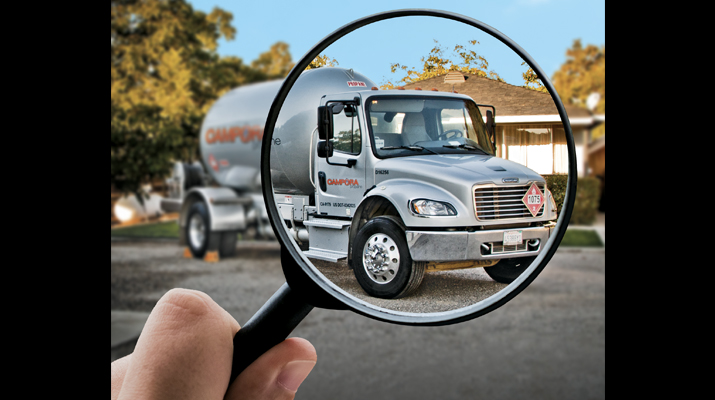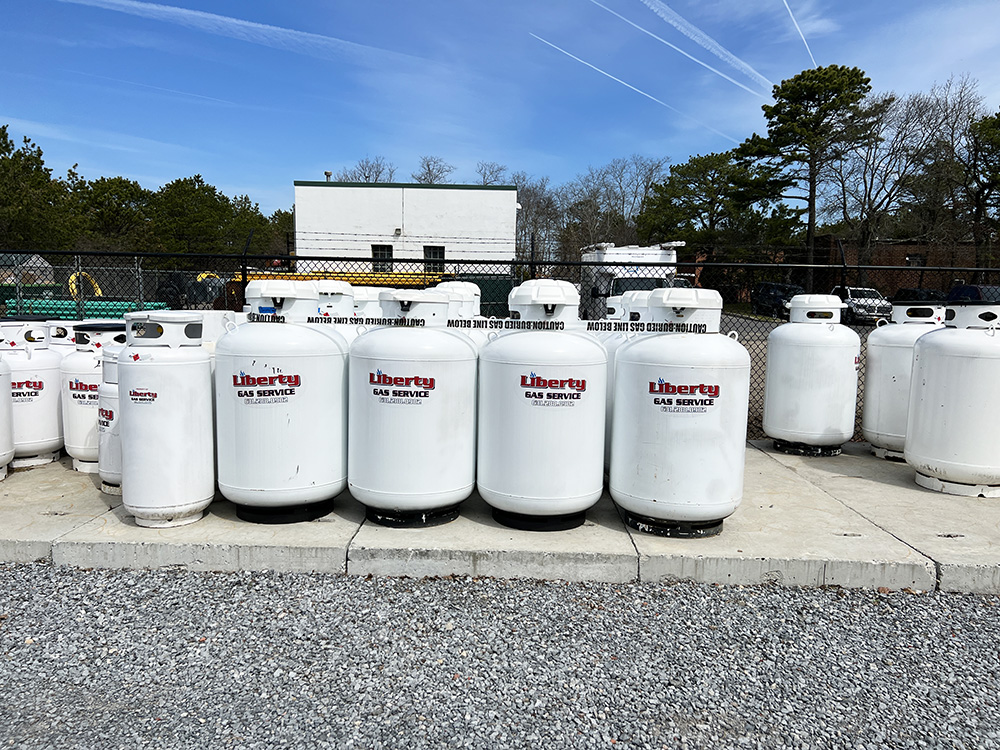Propane company buyers on business relationships, acquisitions process

A day in the life of a propane company buyer involves building strong relationships. (Photo courtesy of Campora Propane; MarioGuti/iStock / Getty Images Plus/Getty Images; Zoom-Zoom/iStock / Getty Images Plus/Getty Images)
A telephone or video call. A sit-down at a local diner. A chat at an association meeting or industry event.
The propane industry companies that grow in part through acquisitions vary their approach to connecting with propane retailers, who inevitably will face key decisions about the future of their businesses.
Some buyer personnel visiting with retailers spend at least half of their time on the road, traveling through airports, renting cars and working out of hotel rooms. Some amass years cultivating relationships, having discussions about the industry or simply serving as a resource – experiences that could one day blossom into an acquisition opportunity benefiting both companies, their customers and their employees.

Dixon
“It’s always very enjoyable to meet with retailers face to face and learn more about their businesses, how they started in the industry and their interests outside of work,” says Daniel Dixon, vice president of corporate development at Energy Distribution Partners (EDP).
The companies interviewed for this story – all representing the buyers’ side of the industry – focused on the enjoyment of those interactions, the networking opportunities and the stories they hear from retailers, many of whom have dedicated their lives to the industry. But LP Gas, through video calls and email interviews, also inquired about the depth of those conversations, what buyers believe make a good fit for their operations and ultimately what determines whether a buyer and seller consummate a deal.

Silecchia
“It is very rewarding because it is a lifestyle of discovery,” says Anthony Silecchia, vice president of acquisitions and industry affairs of Star Group LP. “You are constantly exploring new opportunities and learning more about your industry through the biographies and legacies of the entrepreneurs whose companies we will potentially acquire.
“And while there are some common threads in these success stories, each also possesses key nuances and unique strengths that have set their brand, culture and values apart,” he says. “No two are identical.”
Getting to know you
Some conversations between buyers and prospective sellers are short and to the point. Some are about family, the weather, work and retailers’ outlook on the future. Some conversations go more in depth.
“They are engaging and energizing,” says Noah Smithson, manager of corporate development at AmeriGas Propane, about those conversations. “You talk to someone who has spent their entire life in the propane business, and they have stories upon stories to share about how they have grown such a successful business. They are proud of the businesses they have built. You will never leave a conversation with a propane business owner without learning something new about propane.”
Adds Richard Mayberry, vice president of business development at Ferrellgas, “I learn something new every time I speak with a propane retailer. Before diving in and learning more about someone’s business, it’s important to me to get to know the person first. Beyond that, we’re looking for companies that are a right fit for us, but we also want to be a right fit for them. The deal has to be mutually beneficial for it to work.”
Christina Armentano relates conversations with retailers through the lens of her family’s propane business.

Armentano
“My grandfather started this company in 1968, youngest of 10 children, born in the Great Depression, came from nothing, and this was very much his baby,” says Armentano, executive vice president and COO of Paraco Gas. “When you’re speaking to owners, you have to understand there is an emotional component here. It cannot be only transactional. Many of these individuals have put their heart and soul, blood, sweat and tears into these businesses. And if you approach it as just a purely transactional game and not really getting to understand the mindset of the seller, you will fail.”
Understanding what is important to the seller is critical, Armentano says, so she believes in listening intently, empathizing with retailers in their situations, adhering to confidentiality of the conversation and building a trusting relationship. She also underscores transparency of the process and sharing about how the acquired company will look following a deal.

Mayberry
“Our success is not measured by the number of closed deals,” adds Trent Nagata, senior director of business development at Superior Plus Propane. “Our success is based on strong, ongoing relationships with owners and the health and growth of the acquired businesses, employees and customers post close. It is a uniquely rewarding role in our company that we thoroughly enjoy.”
Retailers have their reasons
For the most part, buyers say their role hasn’t changed much since the COVID-19 pandemic. Companies are more accepting of technology’s use in communications – among buyers’ own team members and for communicating with prospective sellers – but the shutdowns also reminded some about the importance of face-to-face interactions.
COVID, however, did bring about some changes to the way retailers operate – factors that become part of the conversation.
“Inflation and changes in the labor market are driving some owners to want to sell their business or speeding up a timeline they had in place,” Mayberry says.

Stroupe
While retirement is often a main reason retailers sell their business, they have other motivations, such as lacking succession planning options, frustrations with regulations, the cost of steel and challenges finding and retaining good employees, according to Dave Stroupe, executive vice president of corporate development at EDP.
“The common themes we hear are employees and time,” Nagata says. “The difficulty of finding and retaining good employees is the most consistent challenge faced by owners in this increasing inflationary environment we’re all facing. Each region has its unique competing industries that we battle for good employees, so the continued pressure of employee retention is always at the time of the conversation. The increasing requirement and cost to offer incremental employee benefits like retirement plans and greater health benefits are added complexities for keeping their valued employees which are offered by other businesses.”
Dixon doesn’t classify the market as one favoring buyers or sellers; retailers will sell when they’re ready.
“The market was active in 2022. It will be interesting to see what 2023 holds, given higher interest rates,” he says.
An ideal buy or red flags

Nagata
As conversations progress, buyers considering an acquisition follow a certain set of criteria to determine if the companies are on the cusp of a deal.
At EDP, that means moving forward with retailers who have a good staff, newer assets, a strong safety record with documentation, a high percentage of company-owned tanks, primarily residential and commercial accounts, consistent margins and a large percentage of routed accounts.
“When we consider an acquisition, we carefully choose companies that align with our values,” Nagata says. “A focus on customer service, strong ties to the community, a commitment to safe operations. Critically, we are looking for companies with strong, stable teams. There’s lots of companies out there with lots of gallons, trucks and tanks that don’t share the same values.”

Mutually beneficial transactions start with identifying the needs of both buyer and seller. (Photo: Star Group LP)
Silecchia says Star Group looks closely at the employee talent base, brand reputation, sustained customer retention and growth, customer service experience, consistent margin levels, high percentage of tank control, automatic or monitored delivery scheduling, revenue diversification, strategic facility and bulk storage locations.
“My No. 1 is really understanding their installation history,” Armentano says. “No. 2, getting an organization that has the right people on board. If they have strong drivers, strong service technicians, strong office staff – that is incredibly attractive to us. Understanding the mix between company-owned versus customer-owned accounts is helpful, and then how they treat their customers. What is the reputation they have within the community? Do they have a team that really believes in going above and beyond and serving its customer base and its community?”
Buyers are also aware of warning signs that could prevent a deal from moving forward. At EDP, those signs include a yard full of tanks in need of repair or maintenance, poor customer and financial record-keeping, inconsistent margins or a large amount of agriculture business.
“Red flags are often defined by inconsistencies,” Silecchia says. “Things like rapid increases or declines in margins or other revenues. Sudden shifts in account gains or losses or in customer makeup. Clear trajectory changes in operating expenses. Poor accounts receivable aging. High turnover in the staffing or insufficient overall talent base. Unresolved insurance or environmental matters. To one degree or another, these can detract from value.”
As Silecchia says, most sellers experience this process once in their lifetimes.
“That fact should drive the thoughtfulness and thoroughness with which the entire process is approached,” he says.


















Love this Article !! A purchase of another company is not taken lightly its seen from both sides, that is so wonderful to know. I would love to be listening to those conversations and learning the personality of both of the companies!! Love it !!